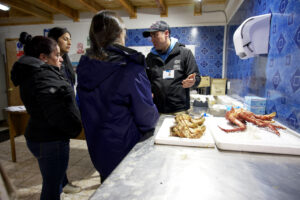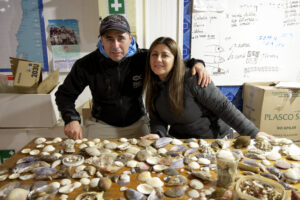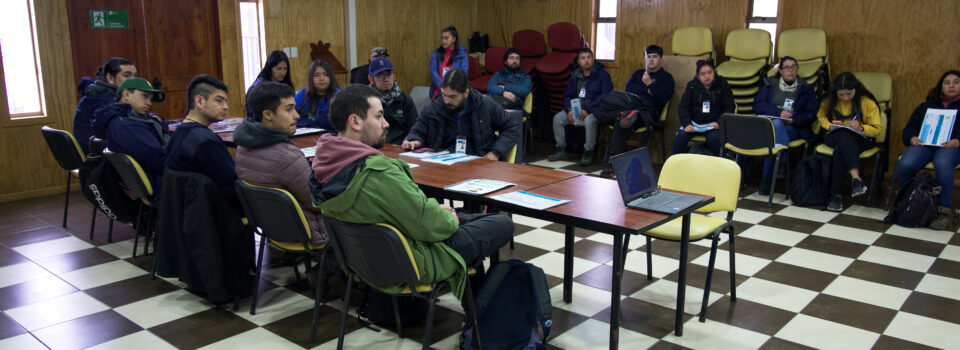IFOP conducts training courses for Scientific Observers 2024
October 30th, 2024 As every year, the Fisheries Development Institute (IFOP) must carry out the procedures to accredit the competences and suitability of its Scientific Observers, in different dimensions, such as: health, permits to carry out work on board and specific knowledge. This last dimension, the knowledge they must have on the subjects inherent to their work, to carry out sampling of Chile’s fishing resources, both in coves or ports, as well as on board artisanal vessels or industrial ships, even for long periods of time. Regardless of the conditions and context in which they carry out their work, the Institute must certify before the fisheries authority that its staff has a set of sufficient and up-to-date knowledge in four dimensions: Identification of marine species, Sampling techniques, Fishing gear and tackle and Fishing regulations. These are the so-called Scientific Observer Training Courses (FOC courses).
As every year, the Fisheries Development Institute (IFOP) must carry out the procedures to accredit the competences and suitability of its Scientific Observers, in different dimensions, such as: health, permits to carry out work on board and specific knowledge. This last dimension, the knowledge they must have on the subjects inherent to their work, to carry out sampling of Chile’s fishing resources, both in coves or ports, as well as on board artisanal vessels or industrial ships, even for long periods of time. Regardless of the conditions and context in which they carry out their work, the Institute must certify before the fisheries authority that its staff has a set of sufficient and up-to-date knowledge in four dimensions: Identification of marine species, Sampling techniques, Fishing gear and tackle and Fishing regulations. These are the so-called Scientific Observer Training Courses (FOC courses).
 In our country, scientific observation has been regulated through various regulations, such as Law 20,265 of 2012 (Discard Law), Decree 193 of 2013 (Regulation of Scientific Observers) and Exempt Resolution 1463 of 2015 (Establishes requirements for the OC of the LGPA). All these regulations have been promulgated by the Ministry of Economy, Development and Tourism (MINECON) and are complementary to the General Law of Fisheries and Aquaculture – LGPA (Decree 430 of 1991).
In our country, scientific observation has been regulated through various regulations, such as Law 20,265 of 2012 (Discard Law), Decree 193 of 2013 (Regulation of Scientific Observers) and Exempt Resolution 1463 of 2015 (Establishes requirements for the OC of the LGPA). All these regulations have been promulgated by the Ministry of Economy, Development and Tourism (MINECON) and are complementary to the General Law of Fisheries and Aquaculture – LGPA (Decree 430 of 1991).
According to our legislation, the Scientific Observer is defined as the natural person designated by the Undersecretariat of Fisheries and Aquaculture, in charge of observing and collecting data on board fishing vessels, landing points or in processing plants, exclusively for research for the purposes of conservation and management of hydrobiological resources (LGPA, Art. 2°, numeral 26 bis).
On this occasion, the entity in charge of teaching the training courses in these four dimensions is the Pontifical Catholic University of Valparaíso (PUCV), a leading institution that has vast experience and national and international prestige in research in Fisheries and Marine Sciences, develops high-level study and training programs and has a highly qualified teaching staff. The evaluation and validation of this knowledge by an entity external to the IFOP generates greater value in terms of content, seriousness and transparency.
In terms of continuous improvement and how to optimize the quality of the learning experience of our Scientific Observers, a FOC Course Program was structured this year that better addresses the complexity of students revisiting the vast majority of the content every year, despite having already passed previous programs. For the year 2024, after the induction and delivery of the study material, a distinction is made between new and old Observers (those who have already taken and passed the courses the previous year). The former must take the entire program: four theoretical courses (one week), 2 days of practical training at the Regional Headquarters or Sampling Centers (Talcahuano, Calbuco and Punta Arenas), hours for personal study (with time officially given within the working day), content pre-evaluations and a final evaluation. For their part, former Observers do not have to retake the four FOC courses, but must complete a Revalidation of Knowledge and update it: study the material provided during their working day, take online pre-assessments and a final exam (2 hours). In this way, this last group, which has the complete study material, can resolve doubts, ask questions and be assisted online by the teaching team, without having to go through the theoretical training again.
Thus, the training program that will be taught between October and December of this year, is divided into 2 categories:
Group 1. Complete training for people who are taking the program for the first time, who must take the four FOC courses, through: a) initial induction, b) synchronous classes on the four topics mentioned, c) assisted personal study; d) participate in a practical workshop on Species Identification and Application of Sampling Techniques, at the assigned regional headquarters, and e) final synchronous online evaluation.
Group 2. Revalidation of knowledge for people who already completed the program the previous year. The workshop for revalidating knowledge of the FOC Courses considers: a) initial induction, b) an official period of review of the study material and assisted guidance, and c) final synchronous online evaluation.
Currently, IFOP has a total of 200 Scientific Observers participating in the Program, in one way or another. These participants belong to 15 projects of the Fisheries and Aquaculture Research Advisory Board (ASIPA) 2024, of the Fisheries Research Division (DIP), and are distributed between Arica and Puerto Williams.
